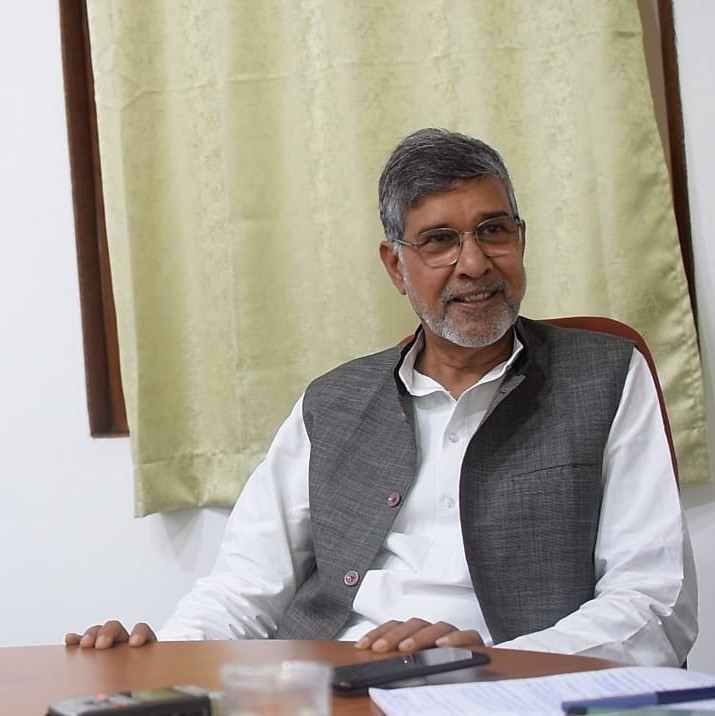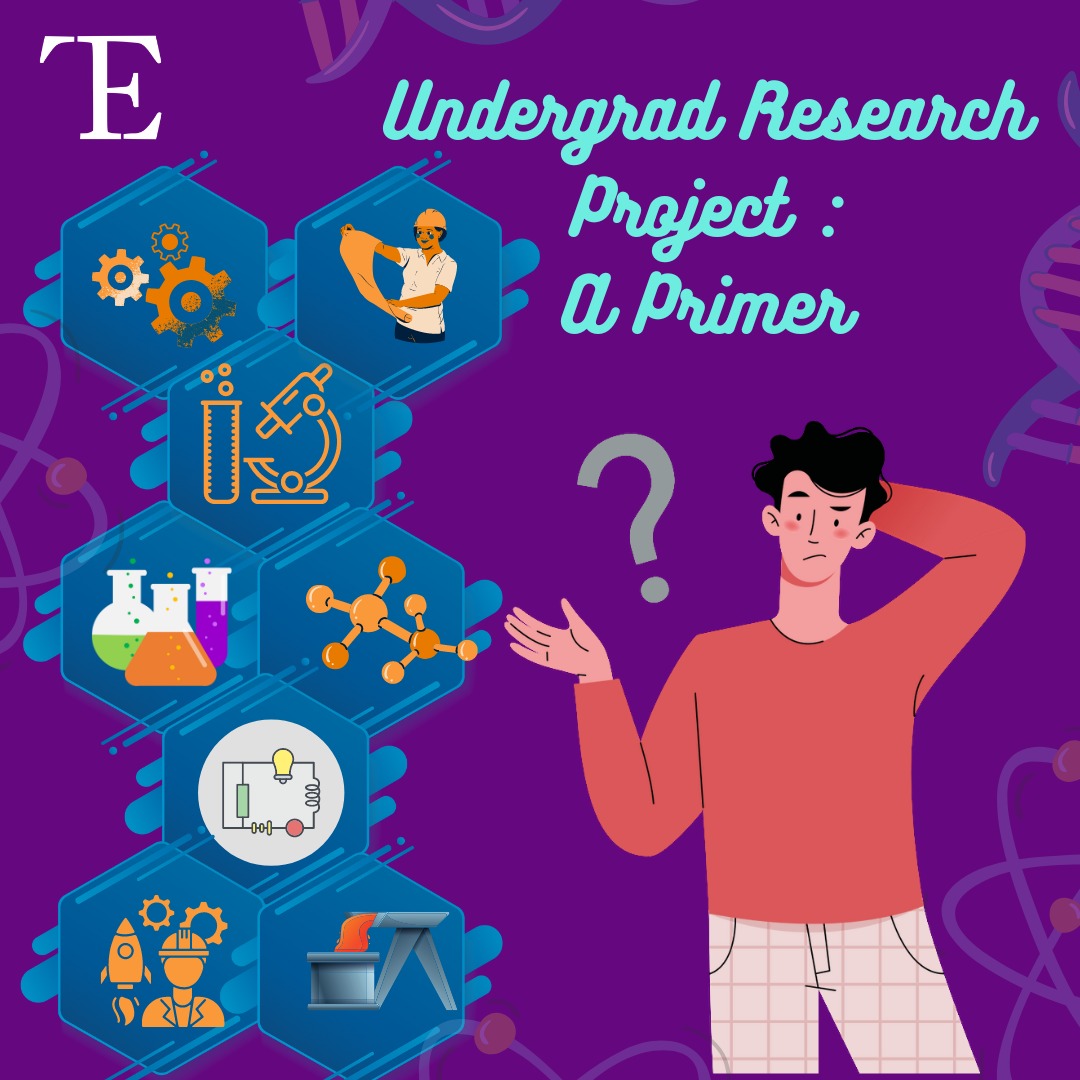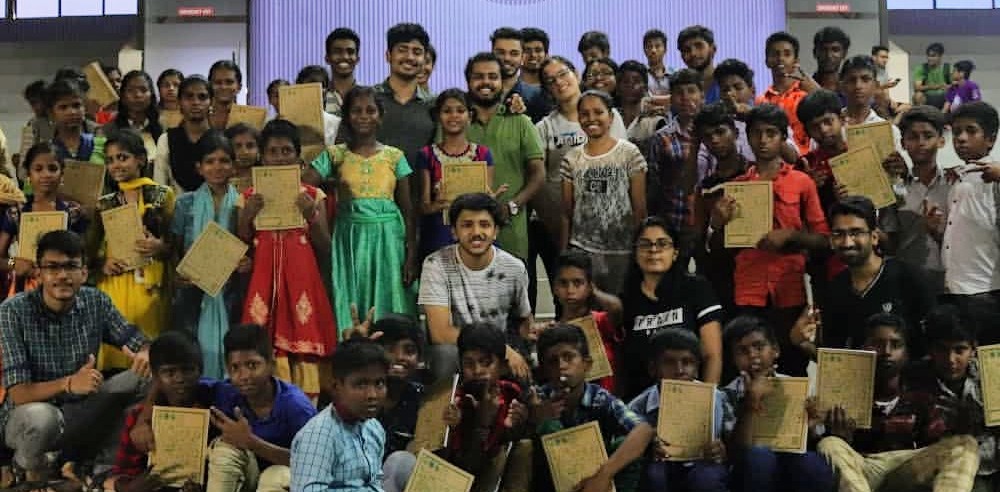T5E sat down with Nobel Laureate, Shri. Kailash Satyarthi for an insightful interview in which he chronicles his earliest memories of an urge to commit to social service, some challenging obstacles in his journey thus far, his message for IIT students and his new initiative – the 100 Million for 100 Million Campaign.
A video of the interview shot by IITMTV can be found here.
T5E: What was the landmark moment when you decided to make this huge career shift from being a lecturer for Electrical Engineering to starting the Bachpan Bachao Andolan? And do you sometimes rethink that choice, especially when you’re faced with dangerous situations -for example, the 2004 incident, where you led a group of activists to rescue Nepalese children from the Great Roman Circus in Uttar Pradesh. You were brutally attacked and held at gunpoint and sustained several injuries. In that context, what message do you have for IIT graduates who want to make a change, and go down an ‘unconventional’ path of doing work for the society – as opposed to going for academia or industry?
You have several questions in one question. Very clever, very clever (laughs). I appreciate your talent in asking several questions in one!
So, I have said this before also, that my first day of schooling was the first spark in my life, the first spark of compassion – when I saw a cobbler’s boy sitting outside the school gate, where I was going. I was five and a half years old, and the boy was more or less the same age. That disturbed me. I started thinking about why I got to go to school, while this boy had to sit outside polishing shoes. I asked my teacher, I asked my parents, my friends – why is this child sitting outside, and not in the classroom? All of them tried to convince me that this is not uncommon, that poor children have to help their families and work, but I was not convinced. One day I asked the boy and his father, who was sitting alongside him. The boy was shy, he did not say anything, but his father answered. He said that his grandfather, his father, and he himself had started such work right from their childhood and therefore, his son did as well. Then with folded hands and miserable eyes, helplessness, he answered, ‘Babuji, you guys are born to go to school but we are born to work like this.’
That made me very upset, very angry. And I started thinking that something is wrong somewhere… because why am I born to go to school and why is this child born to go to work?
This gave me a new perspective of life – whatever my parents say, my teachers say, may not be correct, may not be right. That is just complacency – and an age old mindset. So I refused to accept that any child should work at the cost of freedom and education.
That went on. So it was a gradual, you know, the evolution of the compassion inside me and the activism inside me. So I decided one day that I should give up my career, but I didn’t know the real, actual path because there was no one and no organisation on this issue in India, or elsewhere in the world. People were doing some charity work, but I did not believe in charity. I was trying to understand the systemic problems of this malaise, this evil, this crime. So it was much more difficult to convince people without any proper study or research. But then I started freeing children from slavery and so on, and that helped me to carve a clear path.
It was not an easy choice to give up my career.
In those days, India did not have as many specialized engineers like I was, in transformer design, so it was tough. But I made my decision.
I followed my heart, considering that my mind will follow me. And if my mind will follow me, then the whole world will follow me. But let me begin by following my heart, which people don’t normally do.
They think that it is an emotional thing, it’s not rational, and that we have to think more. And then we don’t take decisions. Sometimes the decisions are delayed because we keep rethinking these things. So that comes to your second answer – I never rethink it. Because I learnt to celebrate and enjoy small successes in life. If I was talking to someone about child slavery and child labour, and if out of ten, or out of hundred, just one was convinced, I celebrated. I thought, oh great, this is a good success. Or even if just one child was freed, then at least one dent has been made on this big wall of slavery. So that was done.
Of course, I have been attacked several times. You have just mentioned one incident of the circus, when I was almost killed – and my son too. He just passed out as a lawyer and he’s helping me with legal things. When we went to rescue some children who were trafficked and enslaved, Nepalese children – most of them girls – it was very difficult. And in the course of freeing them, the circus owner came out with his gun and he put the gun to my head.
It was a fraction of a second – he was just going to pull the trigger – but coincidentally, not to help me but to help that guy, a police person who was conniving with that person (the mafia) – he said, ‘What are you doing? You are creating evidence, because the camera is running in the back’. There was a news channel camera which was on. So the police officer warned this guy, ‘look at the camera’. So he looked at the camera, snatched it away and threw it on the ground. In the meantime, his people attacked me – me, my colleagues, and my son. Some of the parents were lying in a pool of blood. My people took me to the hospital. But I never rethought it.
My son and I were lying on the hospital bed – not unconscious, but there was heavy blood loss and a lot of injuries. My left foot was broken, my right shoulder was broken. My son’s ribs were injured badly. When we looked at each other on the hospital bed, we smiled and I said, ‘I can see that you are alive’. He said, ‘Yes, both of us are alive’. So I said, ‘Nothing is lost, be happy. Think of tomorrow’.
The next day I decided to go on an indefinite fast with a demand that all the girls should be freed, otherwise I am not going to give up the fast. And it was successful, building tremendous awareness in India and in Nepal (the source country of the trafficking in this incident), and I never looked back.
Actually, each time they attack me, and my colleagues – two of them were assassinated, one of them was shot dead, one was beaten to death – I felt that these perpetrators, these criminals are getting weaker and weaker. They are frightened of my organisation and my colleagues and me. So they are trying to eliminate us because of fear. It means that they are threatened by our power. And that is our moral power. So we have to believe in the moral power inside us, and then the fear will evaporate. Of course, fear will come for a while, but it evaporates if you go back to your goal, your purpose in life. Then you are prepared to sacrifice anything for that purpose. If you are convinced that your purpose is right, if you are having that deep conviction that your purpose is right and would be achieved, if you have that hope, you will never be afraid.
And the third question was about IITians?
(laughs) So I am not a priest, nor a politician, so I don’t have anything to preach to anyone, but one thing is clear: IITians are very fortunate. They have graduated, or are going to graduate, from the most prestigious institution of the country and the world. So they should not remained confined in their aspirations and their dreams and desires. They can expand their dreams and be problem-solvers. They can definitely help in finding technological solutions to social problems, environmental problems, even moral problems, even some crimes. For example, artificial intelligence can do a lot in solving crimes against children, crimes against women – trafficking is one of them. So simple technologies can help in those problems. So they can think of them – they can be changemakes in society, more than anyone else.
T5E: This ties in to your concept of ‘globalizing compassion’. Can you speak a bit about that?
Well good, you asked one simple question (laughs). We have globalized markets, and economy and products and technology and knowledge – everything is globalized. You sit here and and anyone can watch me and listen to me in any part of the world, in real time. So, everything is globalized.. and connected in a way. But, unfortunately, we face very deep disconnect from the realities, the truth, and humanity. And these things need to be globalized. The globalization of that human connection is possible only through the globalization of compassion.
The reason is simple – you need not borrow compassion from others. You are born with that.
You have that element of compassion, but it is hidden, or suppressed with the layers of selfishness, layers of hate, and mistrust, and confusion and so on. So we have to remove those layers and then we can enlarge the circle of compassion. So our compassion should not remain confined to our children, or our husband or wife, siblings, etc. It should go beyond that. Compassion means the feeling for suffering of others, of unknown people, as though it is your own feeling, with a desire and drive to change that situation of suffering.
So you are not showing mercy and neither is it an obligation to anyone, because it is your own suffering, and that will get rid of your ego – that you have done something great for others. There is no ‘others’ if you connect with compassion!
So that is the easiest and the most powerful way to save humanity from stress, alienation, anxiety, all kinds of confusion, which we are living with, especially the young generation. The young generation should be the leader and should be the driver of this globalization of compassion movement. If they start practicing compassion among each other – among friends, and relatives, and unknown people in university campuses – then it would be the beginning of globalizing compassion.
T5E: I think this brings us to our final question, which is your 100 million for a 100 million campaign. You are specifically also targeting the youth, so do you feel scared that in some sense it might be restricted to social media activism? Because a lot of people in our generation are very content just by changing their profile picture, and putting a hashtag, rather than going out to protest in the streets, and petitioning for real change?
This is a very intelligent question. All questions were intelligent (laughs)!
So there are two things. One is that the power of youth that involves infinite energy, aspirations, dreams, enthusiasm, excitement, courage to take risks – these qualities of young people have to be not only acknowledged, but respected by the society. Millions of young people in the world who are in a better off situation – like you, like IITians – all of you are much better off than hundreds of millions of other young people of their age.
So I am here to show you the mirror that you are full of power – you are the change, the champion, the hero, the leader. You just have to acknowledge it.
Hundreds of millions of young people are willing to take up challenges for the betterment of humanity, to do something good, to prove themselves. Sometimes they are not able to prove themselves within their families, in their classrooms – some can, some cannot. But all of them have the desire to prove themselves. I am trying to give a purpose and a platform to a hundred million young people to take the charge. Because no voice can be more compelling, no voice can be more powerful for young people than the voice of other young people.
This way we want to globalize compassion. 100 million young people should become the change makers for the lives of 100 million young people left out. Today, more than 100 million young people are left out, they are facing multidimensional violence. So let young people become their voice – that is the idea. Two diversely growing constituencies, and they are growing so fast, and that is going to create much more social tension, much more inequality. Every year when the report comes, we are shocked to see the gulf between these two constituencies of ‘the haves and the have-nots’. That is the problem that has to be addressed by the youth.
But you are absolutely right that the easiest way to do that is social media activism – Facebook activism, Whatsapp activism, twitter activism. That could be a good beginning, but we have launched this campaign with the website 100million.org where youth from many countries (so far the campaign has grown to 35 countries) where young people have not just registered but they are taking up the causes.
We are encouraging them to connect with other young people in their vicinity and their locality. They can become volunteers, they can help in their free time – that is one way. But they can also learn about the policy related issues – the policy deficits, the policy discrimination – and this way, the social media will definitely help. But they have to be sensitized about it.
For example, in a number of countries, there is no restriction on the age of marriage for girls. In many countries the marriageable age is 12. In some countries, like in Bangladesh, it was 18 years, but the politicians pushed to bring it down to 12. They did not succeed fully but they have succeeded in bringing it down to 16. And they are further campaigning that it should be brought down to 12, because it happens in many other countries.
So young people of that country were also supported by youth in America, in Canada, in Germany, who joined hands and said that this is wrong – we cannot tolerate it. When thousands of emails reach the Prime Minister of the country or the parliament members of that country, they cannot simply ignore them – they cannot be put aside.
So it is possible.
Conscious, concerned youth can use this tool of social media. I am quite confident that the future of humankind would be the future of compassion. The world is reaching that stage, which you can call the suicidal stage, the stage of a lot of tension, violence, hatred and negative emotions. So people are feeling loneliness, alienation, stress, anxiety, and so on. This way, people have to go back and think and acknowledge that God’s most precious gift, compassion, can bring us back together to ourselves – to humanity.
Why should we be late then? We should do it now. And if India does not initiate it, or if India does not lead it, then who else will? The world has given us so many good things, let us now give back to the world the most precious thing, and that is compassion.
* Shri. Kailash Satyarthi was invited to the campus as a speaker in the Extra Mural Lecture series. T5E thanks the EML team for facilitating this interview and IITMTV for video support. *




